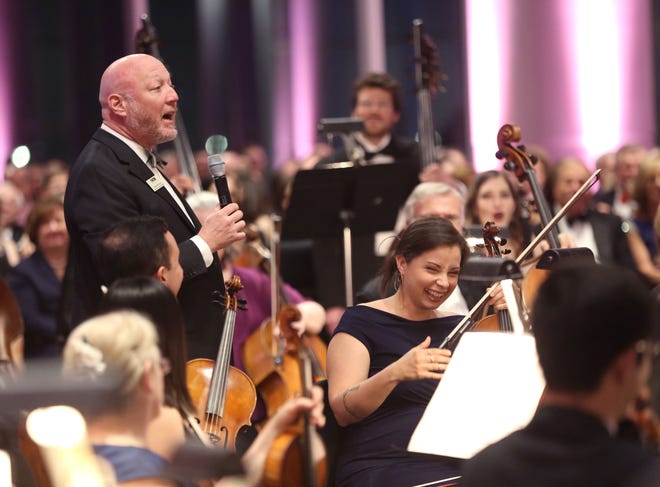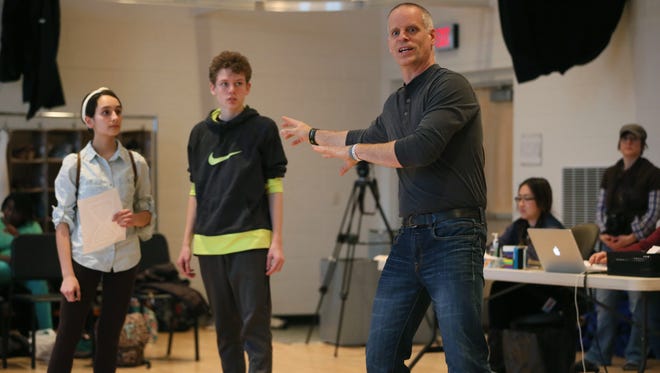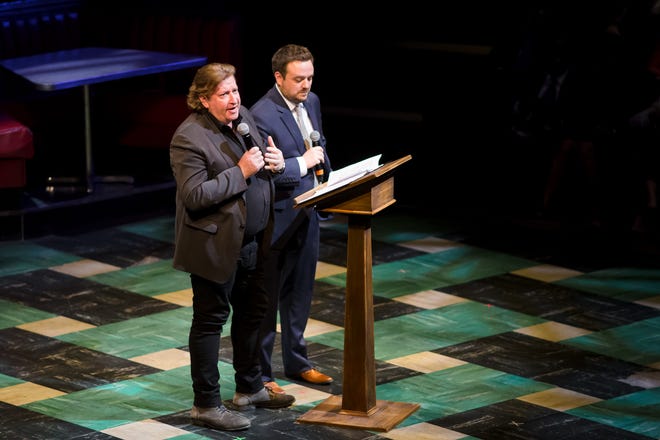Milwaukee Journal Sentinel: Milwaukee arts leaders expect comeback from coronavirus to be slow, gradual and unpredictable
In normal times, Milwaukee arts organizations create powerful shared public experiences through detailed planning.
In mid-March, they ripped everything up in the wake of the coronavirus pandemic and Gov. Tony Evers' safer-at-home orders.
Like other businesses and organizations, they've suffered profound economic disruption. Milwaukee’s United Performing Arts Fund reported recently that its 14 member groups are projecting a collective $8.3 million loss in revenue this season because of the pandemic.
UPAF said those member groups have furloughed, laid off or reduced salaries of more than 500 people. A total of 509 performances have been canceled, affecting 200,000 patrons.
As they grapple with financial survival, local arts groups have shifted vigorously to creating online content and distributable materials to stay connected with their audiences, serve students learning at home and offer meaningful work to their artists.
While they're also strategizing for their eventual return to public activities, the leaders of four of Milwaukee's largest arts organizations make no predictions about when that will happen – or what their returns will look like.
"You think about who our audiences are," said Mark Niehaus, president and executive director of the Milwaukee Symphony. "They’re highly educated people who probably skew older. Those people are going to be careful. I think short of a vaccine that people believe in, I think it is going to be difficult to ask people to gather en masse to go to things in the thousands."

These leaders also know when they open to the public again, conditions will be different.
"When we open back up, we will be in the middle of a recession," said Marcelle Polednik, director of the Milwaukee Art Museum. "It will be a challenging climate."
Paycheck Protection Program loans help some
The MSO, Milwaukee Rep and MAM applied for and received federal Paycheck Protection Program loans of $2.2 million, $1.4 million and $1.6 million, respectively, which will be used to keep paying employees over the next eight weeks. The Small Business Administration will forgive those loans as long as the groups meet certain conditions.
First Stage also applied for a PPP loan but wasn't funded before the initial pool of money ran out. As a result, it laid off staff members who were primarily working in classrooms. Administrators and other staff members will take unpaid furlough weeks. First Stage is applying for the next round of PPP funding, which opened April 27.
But First Stage did receive a boost from a different, unexpected source. To celebrate his 14th birthday, Casey Westphal organized a fundraiser through a virtual talent show featuring children and teens who've been in First Stage programs and performances. To date his effort has raised more than $5,000.
A pair of spectacular videos
Almost immediately after canceling public performances, these groups began creating online content.
The Rep launched a series of short performances by actors and singers from previous shows, topped by a spectacular video of cast members from "In the Heights" (2018), each captured in their respective home neighborhoods, singing the show's finale. It has also branched into weekly wellness videos, including one with Milwaukee Ballet dancer Itzel Hernandez demonstrating simple stretches.
The Rep has also repurposed some of its staff. Bauman said properties director Jim Guy is leading a team that makes weekly wellness calls to the theater company's employees.
The Milwaukee Symphony has published many videos of its musicians performing, including a stunning one that knits together 65 musicians in their own homes playing Elgar's "Nimrod."
Their performance is dedicated to Walter Robb, a former GE executive who endowed the symphony's principal trumpet chair and was a member of the chairman's council. Robb died of COVID-19 March 23 in Schenectady, N.Y., at age 91.
The symphony has also launched Musical Journeys, a weekly streaming audio series drawing on concerts from its audio archives, but incorporating fresh interviews conducted by music director Ken-David Masur with musicians, conductors and composers involved with those concerts.
Milwaukee Art Museum's offerings include 360-degree virtual tours of exhibits, including one of 19th century European paintings.
Simpler choices include short videos of curator of European art Tanya Paul talking about individual paintings, such as Georges Rouault's portrait of poet Paul Verlaine.
Mindful of students, teachers and parents looking for stimulating activities (and bored adults looking for things to do, too), MAM has posted hundreds of lesson plans and do-it-yourself projects, including a guide to making your own shadow boxes in the spirit of Joseph Cornell.
First Stage ponders options for summer academy
While some theater companies have months for planning before potentially beginning fall performances, First Stage has an immediate concern: what to do about its Summer Theater Academy, ordinarily expected to draw some 2,000 students between June 15 and Aug. 21.
Artistic director Jeff Frank and managing director Betsy Corry affirmed that there will be a Summer Theater Academy.
"We’re planning a lot of different iterations between what classes we might still be able to host traditionally in live fashion vs. what might be able to happen digitally, or some combination," Frank said. They've tested some technological options already, and they've picked the brains of nearly 30 members of their student advisory board about which virtual features work well and which don't.

"I think the scarier thing for all of us is the uncertainty of what people are going to feel and what next season looks like," Corry said.
Her administrative peers share her concerns.
"What we’re doing right now is we’re scenario planning on start dates. What does it look like if we start in September?," Niehaus said. "What does it look like if we start in November? What if we wait until Jan. 1? God forbid, what does it look like if we don’t play a note next season? I don’t really think that’s going to happen, but what does it look like on paper?"
Ongoing construction work on the MSO's new home, the Bradley Symphony Center, is on schedule, Niehaus said, looking for some wood to knock on and a rabbit's foot after he said that. "I’m optimistic they’ll be able to continue and that the building will be ready on time. Then the question is, will the country be ready?"
"For now we are not really pegging ourselves to a specific timeline in terms of a date for reopening," Polednik said. "We’re walking the fine line of having some dates in place for planning purposes but also realizing those are fluid and they will change."
Reopening decision is different for each group
When and how to reopen is a set of granular questions for each organization.
Polednik said the museum staff is closely tracking CDC guidelines, Gov. Evers' orders and info from Metropolitan Milwaukee Association of Commerce, Greater Milwaukee Committee and medical authorities. MAM's first step of recovery will be a "phase zero" of safely returning staff to the building under social distancing protocols and likely with some form of PPE, she said.
When the public does begin returning to the museum, Polednik expects to be highlighting work from the permanent collection, for several reasons. That approach fits with the museum's recently announced strategic objectives, and will also help keep costs down in what's likely to be a challenging financial period.
Also, she explained, the pandemic has disrupted the normal flow of lending and dispersing artworks around the country. The "Bouguereau & America" exhibit that MAM co-organized with the Memphis Brooks Museum of Art is stuck in the San Diego Museum of Art. Meanwhile, MAM still has custody of "A Modern Vision: European Masterworks from The Phillips Collection," organized by that Washington museum. It may not be safe enough for some time for these artworks to be returned to museums and collectors, Polednik said.
Bauman said he is closely watching what entertainment venues in Asia are doing. "Every time we think we have a forward looking strategy, the ground sort of shifts beneath us and we have to rethink what we’re doing," he said.

At the moment, he thinks social distancing protocols will still be in place when the Rep reopens to the public. That means spacing people out in theaters, which means reducing capacity. For the Rep, that likely means concentrating on serving subscribers. "We have 10,000 subscribers that have already renewed for next year," he said.
First Stage, which performs both public and school group shows and sends teachers into classrooms, is closely connected to schools. But students returning to school won't automatically mean business as usual for First Stage.
"Even when (schools are) back, are they going to be doing field trips or not?," Frank said. "There’s a world where schools are back and gatherings are allowed and we’re just doing public shows in some form or fashion."
Uncertainty about what people's financial situations will mean for ticket sales, contributions and UPAF giving make it difficult to clearly plan "a season that's going to have much lower earned revenue," Corry said.
While the leaders of these groups have more questions than answers about what's next, they have no doubts about the value of art in facing both the troubling present and the uncertain future.
"Art at its best really inspires us to understand the connections of humans across time," Polednik said, also pointing out its role as "a respite from all of the challenges and real trials we’re up against right now." She has enjoyed seeing on social media how many people are cleverly restaging themselves as famous paintings.
People need a break through something that's beautiful and uplifting, Corry said. In that spirit, First Stage alums around the country have been connecting virtually on Saturdays to read Shakespeare plays together, Frank said.
"We're chomping at the bit to support our city, and to provide a place of comfort and peace and respite and gathering," Niehaus said.
Contact Jim Higgins at jim.higgins@jrn.com. Follow him on Twitter at @jhiggy.
FUNDRAISING EFFORTS
The United Performing Arts Fund, which raises operating funds for local performing arts groups, has extended this year's campaign through Aug. 31. It has also launched a "UNITE with UPAF" collaborative of virtual arts performances. Info: upaf.org and UPAF's Facebook page.
Imagine MKE has established the MKE Artist Relief Fund to support local artists and creators who have experienced who have experienced financial loss due to cancellations. For more info, visit www.imaginemke.org/mke-artist-relief-fund/.
Original article can be viewed HERE.
